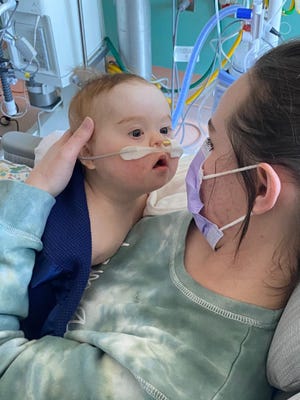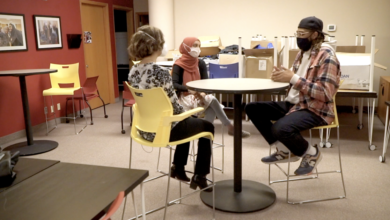
Amy Crosby was haunted by the fear of her baby catching COVID-19. For the South Dakota mom, it was "a nightmare that overplayed in my head that I hoped would never come true."
After months of social distancing and caution, Crosby's nightmare still became a reality: Baby Crue began his battle with the coronavirus in December.
Crue is "one of the happiest 13-month-olds you’ll ever see," but he's especially vulnerable to the virus, his mom told USA TODAY.
Crue was born prematurely and has Down syndrome. His lungs are underdeveloped and he has needed open-heart surgery. All those conditions, and that he is too young to be vaccinated, put Crue at an increased risk for severe disease from the coronavirus.
Stay connected: Subscribe to Coronavirus Watch, your daily update on all things COVID-19 in the USA.
So Crosby said their family took every precaution to avoid COVID-19 after her son's birth during the pandemic: they didn't see family, ordered groceries to the house, and stayed inside for the most part.
"We totally let it inhibit our life," she said.
But on Dec. 9, after her son was exposed to COVID-19 and began exhibiting cold symptoms, she took Crue to get tested. Five days after he tested positive, Crue was admitted to the hospital.

"I think at first, we were just terrified," Amy Crosby said. "Frustrated, because we had done so well. Because I didn’t know what his future would hold or if his body would handle COVID."
The South Dakota family transferred Crue to a hospital in Nebraska so he could receive specialized care. There, he was intubated and put on a ventilator for four weeks.
"It was kind of this roller coaster of emotions," she said. "You’d have really high days where he’d make improvements, then you’d have low days where you think we’re going to be on the ventilator forever."
WATCH:Cars line up for COVID-19 testing at in Orlando amid omicron surge
FREE COVID TESTS:You can order online or with new hotline.
Reported child COVID-19 cases have spiked dramatically across the United States with the rise of the highly contagious omicron variant. In the week ending Jan. 13, over 981,000 COVID-19 cases in children were reported nationwide — a 69% increase over the week prior, and triple the cases from the two weeks earlier, according to the American Academy of Pediatrics.
But omicron is thought to be less severe than other variants, and less than 1.5% of child COVID-19 cases in the week ending Jan. 13 resulted in hospitalization, the organization said. Children made up less than a quarter of a percent of all deaths.
Even as vaccines and a milder variant of COVID-19 have reduced the risk of severe disease for millions of Americans, some like baby Crue remain especially vulnerable to the the virus.
"It was kind of a frustration, because it took our son to have his life at risk to have even people who know us very well to understand it's serious," Crue said. "Until it hits home, people don’t think it’s serious."
After a month on the ventilator, Crue was finally taken off on Jan. 13.
"He’s doing really well — kind of back to his normal self," his mom said. "Happy, funky, very wanting to be independent. He’s able to eat and drink."
Crue will stay in the hospital a bit longer, Amy Crosby said, but is making "lots of advances every day."
Source link










